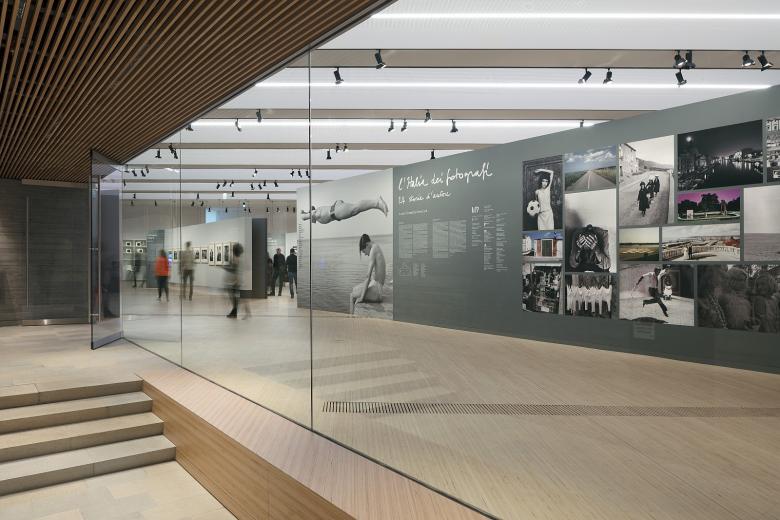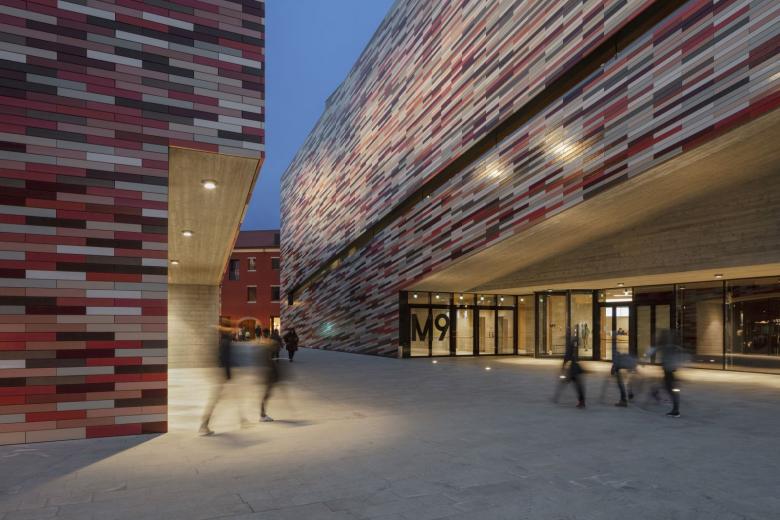M9 Museum

INDUL linear diffuser at M9 Museum in Venice-Mestre
In December 2018, the long-awaited moment finally arrived: it was time for the new M9 Museum on the history of Italy in the 20th century to open its doors to visitors in Venice-Mestre. The result is not just a single freestanding building, but rather an entire museum district. It breathes new life into the urban design and architecture of the previously faceless industrial city of Mestre, at the gateway to Venice. For example, a building block that used to be completely closed off has been opened up and a new diagonal connecting pathway created amid the new museum district.
Numerous restaurants and shops in the ground floor areas of the new district have livened up the urban space. To the same end, the ground floor of the museum is similarly designed as a large public space with a media library, auditorium, museum shop and café. Inside the museum, you can make your way upstairs via a dramatic wide cascade staircase made of rough, exposed concrete. A continuous array of windows lines the staircase and offer visitors a view of the city as they walk up the steps. An elegant, louvred wooden ceiling made of beech wood and a wooden handrail, along with high quality stone flooring, blend with the rough, exposed concrete of the walls to create an expressive material composition. The first and second floors present the history of Italy in the 20th century, whilst the third
floor – flooded with natural daylight from above – is reserved for temporary exhibitions.
The importance of ventilation and air conditioning technology in museums
Ventilation and air conditioning technology is extremely important in museum construction, as it is largely responsible for the preservation of art treasures. The optimum air humidity and temperature levels depend on the exhibits on display and is usually determined by the conservators responsible. The internationally recommended standard values are 20 °C at 50 % relative humidity. Even more important than keeping to these absolute values, however, is the maintenance of constant air conditions in the room: rapid fluctuations in temperature and humidity are extremely detrimental to the exhibits. Slower changes, such as those that take place as the seasons change, are not problematic. With mixed ventilation systems such as the INDUL N linear diffusers, it is possible to implement relatively high air exchange rates and high temperature differentials – these are necessary to avoid the rapid temperature and humidity fluctuations unwittingly caused by groups of visitors.
Planning offices and architects commissioned to build museums always have to consider how best to integrate ventilation and air conditioning technology at an early stage in the design process. The technology can then be optimally integrated into the existing architecture – without having to compromise on the design of the exhibition rooms. In addition to proven standard solutions, Kiefer also offers customised products which are perfectly tailored to the construction project in question.
Special features
In addition to their elegant design, INDUL N linear diffusers are highly functional. In ventilated rooms, they offer a feel-good atmosphere without perceptible draughts. This is due to special air discharge geometry that produces fine individual jets of air. The ambient air is mixed with these individual jets, whereby the tempe-rature differential between the supply air and room air is reduced over a short distance. Temperature differentials down to -14 K can be easily balanced out. The velocity of the supply air being discharged to the occupied zone is also reduced to such an extent that draughts cannot occur in the first place. With INDUL N linear diffusers, the highest standards of comfort can be achieved through a diffuse, completely smooth ambient air flow. The air flow rate is between 20 and 250 m³/hm.
A further benefit of this technology: ceilings do not become soiled over time, as Kiefer's free air jet feature distributes the supply air directly into the occupied zone, without dampening the ceilings.

- Year
- 2018

